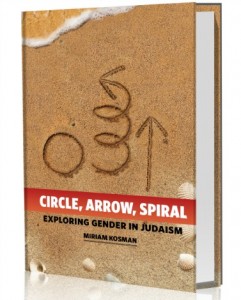
Circle, Arrow, Spiral: Exploring Gender in Judaism by Miriam Kosman
NLEResources.com is featuring a series of the following four full chapters from Circle, Arrow, Spiral over the next several weeks: 1) Shelo Asani Isha, 2) The Roots of the Inequality of Women, 3) Witnesses and 4) Polygamy.
Unquestionably, one of the principal hurdles for a newcomer to Orthodox Judaism is feeling at ease with the respective roles of men and women. Are men and women equal in Judaism? Is equality even a Jewish goal? If it isn’t, how do we reconcile a just G-d with inequality?
In a society in which it is no longer clear who brings home the dough and who bakes it, who changes the baby and who changes the tires, what does it really mean to be male or female? Should gender make any difference in our life, or should we all just do what we are good at and forget labels? These are burning questions in a society where norms are changing at a rapid clip.
The impetus to research the topic of gender in depth and to develop a satisfying narrative, came from Mrs. Miriam Kosman, a lecturer who has spent years teaching Jewish philosophy and thought to secular Israeli university students. She came to the important realization that her students needed a different approach to Judaism’s understanding of gender – one that clearly resonates with the way that real men and real women are living their lives today.
After years of research and study, drawing heavily on the Torah of Rav Moshe Shapiro, shlita, and refining the concepts while teaching her students in Nefesh Yehudi, the unique approach presented in Circle, Arrow, Spiral: Exploring Gender in Judaism was developed.
The book received strong rabbinic approbation from Rabbi Aharon Feldman, shlita, Rabbi Aaron Lopianksy, Rabbi Todrus Miller, and Rabbi Avraham Edelstein. The book offers a refreshing, non-apologetic approach to gender. Rabbi Miller writes, “The author has rigorously researched the relevant authoritative sources across the spectrum of Torah thought: Halachic, Aggadic, Kabbalistic, philosophic and much more, and profoundly presents a panorama of this much discussed but little understood topic with clarity, sophistication, sensitivity and vision.”
Click here to download the first installment of Shelo Asani Isha.
To view more of Miriam Kosman’s writing, visit her website, miriamkosman.com.



















